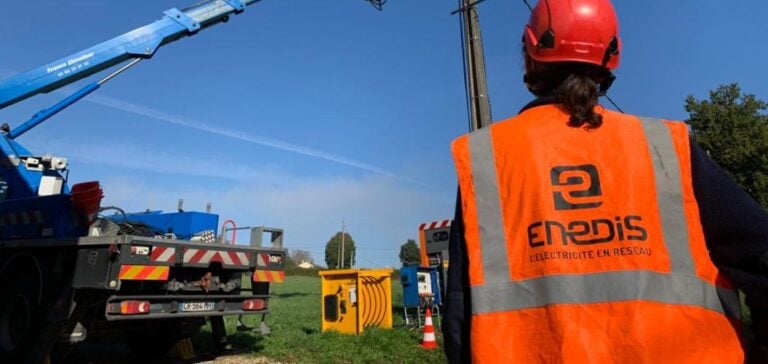In Ergué-Gabéric, a village in Finistère, a team of workers is busy burying the final meters of an underground electrical cable. This operation, conducted by Enedis, the main electricity network operator in France, symbolizes the measures being implemented to adapt the network to the effects of climate change. In this region frequently hit by storms, including the devastating storm Ciaran last year, modernizing electrical infrastructure has become a strategic priority.
The company is burying 1,100 kilometers of cables in Brittany, replacing vulnerable overhead lines with underground installations, which are better protected from extreme weather. This approach aims to limit power outages and ensure greater resilience for Breton homes and businesses, as part of a vast network renovation program.
A strengthened network to face climate challenges
Storm Ciaran left more than a million homes in Brittany without power, highlighting the need to make the network more resistant to extreme weather events. To address the intensification of these phenomena, Enedis has launched a specific plan for the region, involving the reconstruction and adaptation of 2,000 kilometers of electrical lines over five years. “Climate events are increasing and becoming more localized, so we need to act quickly,” explains Hervé Champenois, technical director at Enedis.
According to Pierre-Olivier Courtois, head of the “Brittany Reconstruction” plan, storms and falling trees pose major risks to overhead cables. Enedis also plans to modernize 3,500 kilometers of lines in Brittany between 2025 and 2029, a project valued at 390 million euros.
High cost but a sustainable investment
Burying cables guarantees greater resilience, but it costs five times more than renovating overhead lines. Therefore, Enedis focuses this method in areas where trees and storms pose the highest risks. For low-voltage lines that directly supply households, the company replaces the old copper “bare wires” with twisted aluminum cables encased in plastic sheaths. This type of cable, known as “twisted pair,” better withstands severe weather and allows the power supply to continue even if the cable falls.
The recently presented National Climate Adaptation Plan (PNACC-3) recommends such measures to secure infrastructures against a changing climate. Enedis allocates about 1.3 billion euros annually to network adaptation, an investment that accounts for a quarter of its total 96 billion-euro plan through 2040.
A race against time for Enedis
The Breton project symbolizes a “race against time” for Enedis and its teams. Each storm tests the network’s resilience, underscoring the importance of investing in durable, innovative solutions. Twisted cables, installed on 1,400 kilometers of existing lines, facilitate repairs in case of damage, thus helping to reduce the duration of power outages.
Climate events in Brittany are part of a broader context for Enedis, which must also respond to floods in other French regions and urban heatwaves. By modernizing its infrastructure, Enedis addresses the challenges posed by climate change, as well as the expectations of a population increasingly dependent on a reliable power network.






















